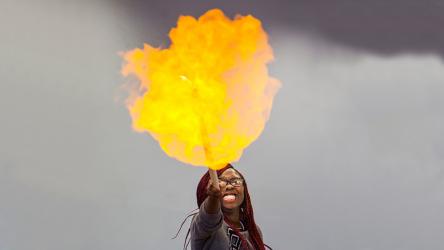An academic from The Australian National University (ANU) has taken his inspiring science shows to 41,000 children in Africa as part of an 11-week tour through five countries. The project is a collaboration between the Australian National University and Questacon, with funding from Questacon and the Australian Government.
Dr Graham Walker from the ANU National Centre for the Public Awareness of Science also trained more than 500 teachers and 162 African staff and left them with equipment so they could continue to run inspiring science programs.
"The numbers just blew us away," Dr Walker said. "There were days in Botswana where we saw 5,000 kids, arriving from a continual stream of buses."
The crowds saw makeshift rockets propelled by bicarb soda, levitating beach balls, and many things set on fire, but the memory that sticks with Dr Walker is the simple magnet.
"These kids - and even some of the teachers - have learnt the idea of magnetism, and they've done exams on magnetism, but they'd never held a magnet until we gave them one," he said.
"Can you imagine holding two magnets together for the first time, experiencing magnetism?"
Dr Walker and teammate Joe Duggan lugged the magnets and other everyday items to be transformed into science experiments on their Science Circus tour of Mauritius, South Africa, Botswana, Zambia and Malawi.
The project, funded by the Australian Government's Department of Foreign Affairs and Trade, Questacon and ANU, has left a legacy by training local teachers and staff from local science centres to follow in their tracks.
"We donate equipment to them, and build a little exhibition, like a very rudimentary version of Questacon, for them to keep," Dr Walker said.
"We give them the skills, the resources, the training, and hopefully we're planting the seeds so it can grow into local, home-grown science communication - and we're already seeing results.
"Having kids who can think scientifically is a wonderful outcome for them personally. In the long term, it's also going to generate a better economy and drive productivity at a systemic level for these countries.
"On an individual level, I've seen stories in South Africa where kids, through exposure to a science centre and the kind of program we're doing, manage to lift themselves up from being the workshop grunt to being the engineer in the workshop, and lift their whole extended family out of poverty with them."
Dr Walker says the content of the Science Circus Africa shows developed throughout the tour to incorporate examples relevant to local life, such as applying the science of fire to the use of charcoal burners in the home.
He has been working with the Australian National Centre for the Public Awareness of Science at ANU on and off for 15 years.
Dr Walker is a graduate of the Shell Questacon Science Circus, the domestic science outreach program developed by ANU and Questacon 30 years ago, and now seen by 2.2 million Australians.
A video of Dr Walker's trip can be seen on the ANU Channel.

